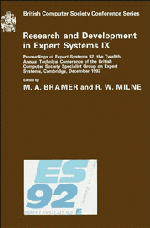Book contents
- Frontmatter
- Contents
- Preface
- Introduction
- CONSULTANT: providing advice for the machine learning toolbox
- A methods model for the integration of KBS and conventional information technology
- KBS methodology as a framework for co-operative working
- Project management for the evolutionary development of expert systems
- The specification and development of rule-based expert systems
- Towards a method for multi-agent system design
- Jigsaw: configuring knowledge acquisition tools
- On the relationship between repertory grid and term subsumption knowledge structures: theory practice tools
- Strategy maze: an on-line tool for support management of the knowledge acquisition process
- Concurrent engineering using collaborating truth maintenance systems
- Ockham's razor as a gardening tool
- A designer's consultant
- Fairness of attribute selection in probabilistic induction
- An application of case-based expert system technology to dynamic job-shop scheduling
- Neural network design via LP
- KEshell2: an intelligent learning data base system
- Approaches to self-explanation and system visibility in the context of application tasks
- An object oriented approach to distributed problem solving
- Intelligent user interface for multiple application systems
- Combining qualitative and quantitative information for temporal reasoning
- Documents as expert systems
An object oriented approach to distributed problem solving
Published online by Cambridge University Press: 04 August 2010
- Frontmatter
- Contents
- Preface
- Introduction
- CONSULTANT: providing advice for the machine learning toolbox
- A methods model for the integration of KBS and conventional information technology
- KBS methodology as a framework for co-operative working
- Project management for the evolutionary development of expert systems
- The specification and development of rule-based expert systems
- Towards a method for multi-agent system design
- Jigsaw: configuring knowledge acquisition tools
- On the relationship between repertory grid and term subsumption knowledge structures: theory practice tools
- Strategy maze: an on-line tool for support management of the knowledge acquisition process
- Concurrent engineering using collaborating truth maintenance systems
- Ockham's razor as a gardening tool
- A designer's consultant
- Fairness of attribute selection in probabilistic induction
- An application of case-based expert system technology to dynamic job-shop scheduling
- Neural network design via LP
- KEshell2: an intelligent learning data base system
- Approaches to self-explanation and system visibility in the context of application tasks
- An object oriented approach to distributed problem solving
- Intelligent user interface for multiple application systems
- Combining qualitative and quantitative information for temporal reasoning
- Documents as expert systems
Summary
Abstract
One of the principal difficulties in developing a distributed problem solver is how to distribute the reasoning task between the agents cooperating to find a solution.
We will propose the distributed logic programming language DLP as a vehicle for the design and implementation of distributed knowledge based systems. The language DLP combines logic programming with active objects.
We will show how object oriented modeling may be applied for the specification and implementation of a distributed diagnostic (medical) expert system. The example illustrates how the diagnostic process is distributed over the agents participating in the diagnosis according to the structure of the knowledge of that particular domain.
Keywords:object oriented modeling, distributed problem-solving, knowledge-based systems, expert systems, distributed logic programming
Introduction
Logic programming offers a declarative way to solve problems in Artificial Intelligence. However, when implementing large (possibly distributed) systems, traditional software engineering problems such as modularization and the distribution of data and control reoccur. Cf. [Subrahmanyam, 1985].
One of the principal difficulties in developing a distributed problem solver is how to distribute the reasoning task between the agents cooperating to find a solution.
Due to its declarative nature, logic programming has become popular for implementing knowledge-based systems. However, lacking adequate modularization facilities, logic programming languages such as Prolog fall short in providing the mechanisms necessary to specify the distribution of data and control.
Object oriented modeling To tackle these problems, we suggest in this paper to embed the logic programming paradigm into an object oriented approach.
- Type
- Chapter
- Information
- Research and Development in Expert Systems IX , pp. 285 - 300Publisher: Cambridge University PressPrint publication year: 1993

